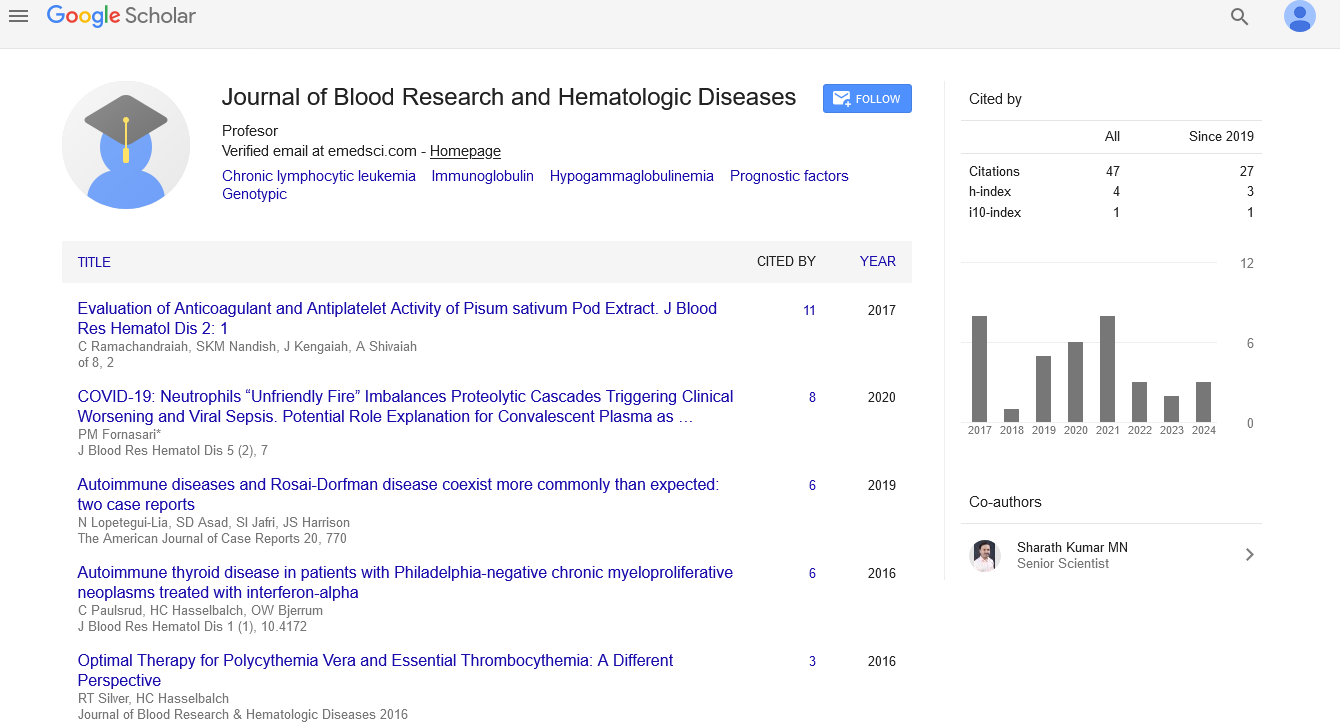Commentary, J Blood Res Hematol Dis Vol: 8 Issue: 2
Understanding Blood Cell Physiology: The Essential Roles of Blood Cells
Youssra Lassila*
1Department of Cell and Developmental Biology, University of Pennsylvania, Philadelphia, United States of America
*Corresponding Author: Youssra Lassila,
Department of Cell and Developmental
Biology, University of Pennsylvania, Philadelphia, United States of America
E-mail: lassila453@gmail.com
Received date: 29 May, 2023, Manuscript No. JBRHD-23-106774;
Editor assigned date: 31 May, 2023, PreQC No. JBRHD-23-106774 (PQ);
Reviewed date: 14 June, 2023, QC No. JBRHD-23-106774;
Revised date: 21 June, 2023, Manuscript No. JBRHD-23-106774 (R);
Published date: 28 June, 2023, DOI: 10.4172/jbrhd.1000166
Citation: Lassila Y (2023) Understanding Blood Cell Physiology: The Essential Roles of Blood Cells. J Blood Res Hematol Dis 8:2.
Description
Blood is a fascinating and vital fluid that courses through our bodies, carrying out a multitude of functions necessary for our wellbeing. Understanding the inner workings of these remarkable cells is essential for advancing our knowledge of human physiology and developing new strategies for diagnosing and treating blood-related disorders.
Blood cell types and functions
The human body contains three main types of blood cells: red blood cells (erythrocytes), white blood cells (leukocytes), and platelets (thrombocytes). Each type has a distinct function and contributes to overall health.
Red blood cells are responsible for carrying oxygen from the lungs to various tissues and organs, and the iron-containing protein called haemoglobin. This oxygenation process is important for cellular respiration and energy production. Additionally, red blood cells aid in removing carbon dioxide, a waste product, from tissues and transporting it back to the lungs for exhalation.
White blood cells, on the other hand, form the backbone of the immune system. They defend the body against invading pathogens such as bacteria, viruses, and fungi, as well as abnormal cells, through a complex network of interactions. Different types of white blood cells, including neutrophils, lymphocytes, monocytes, eosinophils, and basophils, have specialized functions such as phagocytosis, antibody production, and regulation of immune responses.
Platelets, the smallest of the blood cells, are essential for blood clotting (haemostasis). When blood vessels are damaged, platelets aggregate at the site, forming a clot that prevents excessive bleeding. This function helps in maintaining the integrity of blood vessels and promotes wound healing.
Role of blood cells in health and disease
In a healthy individual, the coordinated functions of blood cells ensure the proper functioning of various systems and maintain homeostasis. However, when imbalances or abnormalities occur, they can lead to diseases.
Anaemia, a condition characterized by a deficiency in red blood cells or haemoglobin, results in decreased oxygen-carrying capacity. This can lead to fatigue, shortness of breath, and decreased overall vitality. Conversely, conditions like polycythaemia vera, characterized by an excess production of red blood cells, can cause thickening of the blood and increase the risk of blood clots.
White blood cell disorders can manifest in different ways. Leukaemia, a cancer of the white blood cells, results in uncontrolled growth and impaired function. It can lead to weakened immune responses and an increased susceptibility to infections. Autoimmune disorders, such as lupus and rheumatoid arthritis, involve the malfunction of white blood cells, leading to attacks on healthy tissues and organs.
Platelet dysfunction or deficiencies can result in abnormal bleeding or clotting. Haemophilia, a hereditary disorder, is characterized by a lack or dysfunction of specific clotting factors, making individuals prone to excessive bleeding. Conversely, conditions like thrombocytosis, marked by an excess of platelets, can increase the risk of abnormal clot formation, leading to conditions such as deep vein thrombosis or stroke.
Conclusion
Blood cells, with their diverse functions and interactions, are integral to our health and well-being. Their precise regulation and coordination ensure the proper functioning of various physiological processes. An in-depth understanding of blood cell biology not only helps us comprehend the mechanisms underlying health but also paves the way for advancements in diagnosing and treating blood-related diseases. Ongoing studies in this field holds the promise of novel therapeutic strategies and personalized interventions to restore the delicate balance within our bloodstream and improve the quality of life for countless individuals affected by blood disorders.
